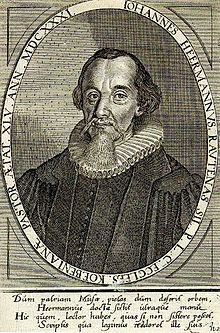What do you want to grieve

What do you want to grieve is a Lutheran hymn by Johann Heermann . He published it in 1630 in the volume Devoti musica cordis . The subject is trust in God in the face of enemies.
history
Heermann, the poet of the song, was influenced by the treatise Buch von der Deutschen Poeterey by Martin Opitz , which appeared in 1624.
Heermann was living in Köben , Silesia , when he wrote the song. The city suffered from the Thirty Years War and was plundered four times. Heermann lost his belongings several times and had to flee at risk of death.
He then published a volume of hymns in Wroclaw in 1630 , Devoti musica cordis, Hauss- und Herz-Musica , which contained What do you want to grieve . The volume included, among other things, O Jesus Christ, true light , dearest of Jesus, what have you done wrong , O God, you pious God and Lord our God, do not let yourself be put to shame . A fourth edition, 1644, contained Jesus, Your Deep Wounds .
Structure and text
What do you want to grieve treats trust in God in the face of enemies, up to and including Satan . The seven stanzas each have eight lines in bar form (Stollen – Stollen – Abgesang). Each tunnel has two lines, the swan song has four, the outer and inner lines rhyming.
- What do you want to grieve
- Because God does not leave anyone
- You dare to go on him
- Even if straight from hell
- He judges in his honor
- So I surrender to him
- Lord, give me your honor
The song begins with an address to one's own soul, as in some psalms, for example Psalm 103. This view of the individual differs from Martin Luther's approach in the song A strong castle is our God , which deals with a similar topic. The beginning is a repositioning of Psalm 42: 5, which Luther had translated: “Why are you sad, my soul, and are you so restless in me? Wait in God ”.
The central fourth stanza begins with strong words about Satan as an enemy: "Even if straight from hell / Satan wanted to oppose himself / yourself / and rage against you".
The last stanza has “O Father, Son, and Spirit” as the highlighted fifth line.
melody
The text is sung to the tune of Von Gott ich nicht Lassen . This melody originated from a secular song similar to the Monica melody that was popular in Europe from the 16th century. The melody of Mit Ernst, o Menschenkinder, is similar . The fifth line, the beginning of the swan song, is highlighted: It begins an octave higher than the previous note and ends with a pause, after which the other three lines of the swan song are sung continuously. Heermann seems to have written the text for the melody, because the climax of the text is also in several stanzas in line 5.
Dubbing
In 1724 Johann Sebastian Bach composed the choral cantata What do you want to grieve yourself, BWV 107 on the unchanged words of the chorale and set the melody in movement 1 in 4/4 time, in the last movement in 12/8 time.
Web links
- Johann Heermann on the bach-cantatas website
- Cantata BWV 107 What do you want to grieve on the bach-cantatas website
- BWV 107 What do you want to grieve text, University of Alberta
Individual evidence
- ↑ a b c Johann Heermann ( English ) ccel.org. 2006. Retrieved August 3, 2011.
- ↑ Johann Heermann 1585–1647 ( English ) Cyber Hymnal. 2011. Retrieved August 3, 2011.
- ↑ a b c What do you want to grieve / Text and Translation of Chorale ( English ) bach-cantatas.com. 2006. Retrieved August 1, 2011.
- ↑ a b c Chorale Melodies used in Bach's Vocal Works / From God I won't let go ( English ) bach-cantatas.com. 2006. Retrieved August 2, 2011.
- ↑ Chorale Melodies used in Bach's Vocal Works / The "Monica" - Historical Background ( English ) bach-cantatas.com. 2006. Retrieved August 3, 2011.
- ^ John Eliot Gardiner : For the Seventh Sunday after Trinity / St Mary's, Haddington ( English ) solideogloria.co.uk. 2009. Archived from the original on October 5, 2011. Info: The archive link was automatically inserted and has not yet been checked. Please check the original and archive link according to the instructions and then remove this notice. Retrieved August 1, 2011.